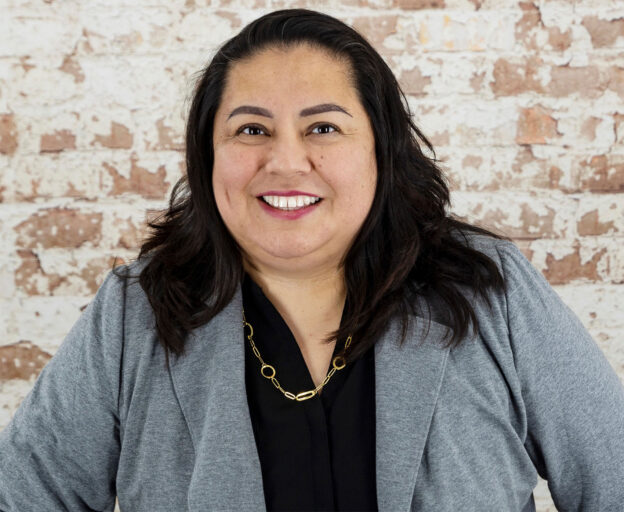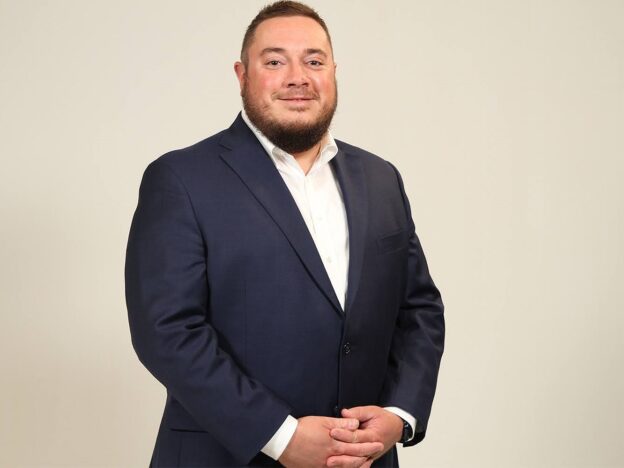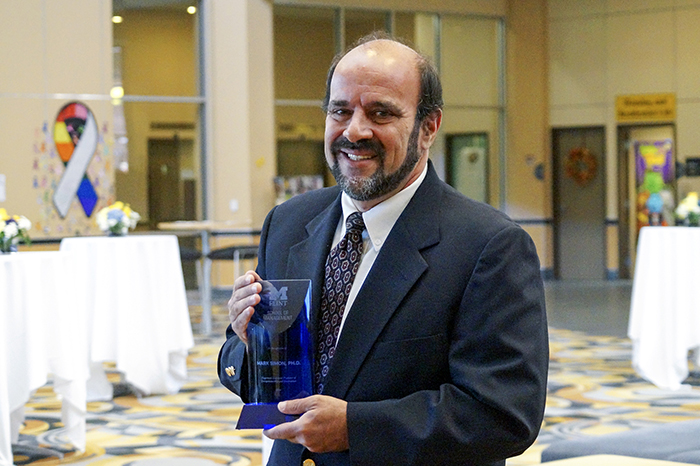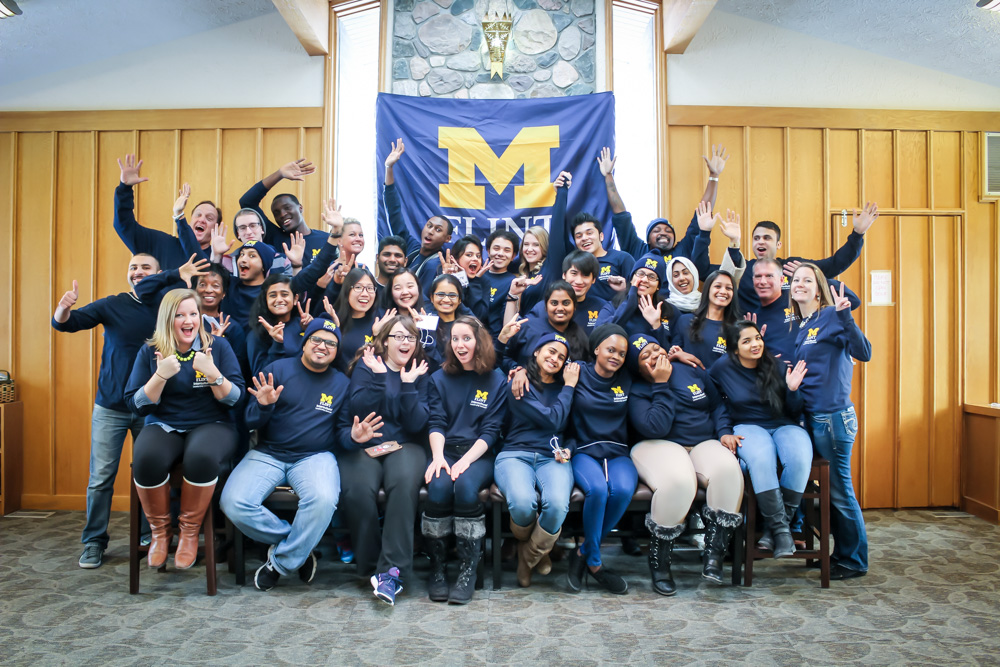Jania Torreblanca graduated in 2021 & 2022 in the dual degree master’s program receiving MBA and MSLOD degrees. Her college career started in high school which led her to the US Navy allowing her the opportunity to learn a trade, travel, and be independent. Jania explains her education took a longer path but that she does not regret the choices. As our alumni spotlight Jania talks about valuing your connections, the resilience of her and her classmates during covid, and her future goal to teach at the college level.
Q: Where are you currently working and your title? How long have you been in this position or at this organization?
A: I am the Senior Director, Sterile Processing for The Resource Group, Spend Management Solutions, a subsidiary of Ascension. I have been with The Resource Group since December 2021. As the Senior Director, Sterile Processing, I lead one arm of the Sterile Processing Community and work in sync with our Sterile Processing Operations leaders. We currently manage the Sterile Processing departments across 12 states where Ascension operates.
In my role, I am in charge of leading a team who is creating and driving a national strategy, in a standardized, clinical integration approach for the Sterile Processing department’s education, quality, best practices, and regulatory compliance initiatives.
Q: What is your job like day to day?
A: My day-to-day job varies by week and project we are working on, however, I can group it into two different types of work: strategy development/support and clinical support. For perspective, we currently have 101 workstreams we are working through.
A typical day consists of meeting with our national teams, creating/supporting the work of an initiative, removing barriers, and providing guidance. The other half of my day is spent meeting with our local leadership teams and helping them through action items, Joint Commission visit work plans, and providing them the connections, tools, and documents they need to address an issue.
The fun part of my work week is when I am able to travel to one of our hospitals and I get to interact with our front-line staff and leaders. I enjoy meeting them and learning about them and their passion for the work we do. The dedication and energy I hear from them motivate me, even more, to continue to complete our national work so I can help them have a more satisfying work environment.
I can honestly say that I love my job and I love the people that I work with, I cannot imagine doing anything other than what I am doing today.
Q: Why did you choose to attend UM-Flint for your degree(s)?
A: I chose UM-Flint, because of the smaller class sizes and the way the courses are taught. In today’s business world, the work is conducted in teams- there are rarely projects that are accomplished alone and as an aspiring executive, I needed to make sure that my course of study was taught in the same manner. UM-Flint did an awesome job in providing that framework, I never imagined that an accounting project and a finance project could have a team project deliverable!
Q: Share your best college memory
A: My best college memory is about meeting people for who they are as individuals and not by their titles. I met hospital executives, physicians, and other business executives who did not bring their titles to the classroom. They were personable and students just like me or they were professors who were sharing personal learning experiences of what worked and didn’t work for them.
Q: What is the most important thing you learned while you were at UM-Flint?
A: I started the Master’s program, a year before the pandemic and was deep in my studies when the COVID-19 pandemic started. Most importantly though, I learned how resilient my classmates and I were for not giving up when things became really hard. At the onset of the pandemic, I was working 10-12 hours a day, on-site at the University of Michigan Health, and yet I continued powering through work and school. The assignments and projects didn’t ease up, so I learned how to balance my time and attention appropriately to family, work, and school and NOT give up on either one. I am so grateful for the time-management and organizational skills I learned during my studies at UM-Flint and I have carried those on to my work today.
Q: How did your education at UM-Flint prepare you for what you are doing today?
A: The varied course work and case study analysis in the dual degree program MBA/MSLOD helped me prepare for my current role and for my future roles. Learning about strategy development, organizational behavior, change management, talent and recruiting, negotiation and so many other courses has helped me as I perform my current work. Truly, every single course I enrolled in, has helped me become a better leader.
Q: Describe your career path.
A: My career path has not been a straight line and I changed directions several times throughout my initial years after high school.
When I was in high school I actually started attending college classes in the evenings during my junior and senior years. While other kids were working or doing extracurricular activities, I was attending classes and learned about philosophy, art, and politics. It doesn’t sound like fun, but I truly enjoyed learning about Socrates and Descartes’s “Discourse on Method,” and at that point, I wanted to become a philosophy major! However, I learned about the US Navy, and the opportunity to learn a trade, travel, and be independent, convinced me to put my bachelor’s degree on hold and go on a journey.
I spent 5 years in the US Navy as a Hospital Corpsman and learned that I actually loved healthcare. During my years in the Navy, I listened to my recruiter and volunteered for every training program possible. So, I was a certified EMT-B, Food Inspector, Sterile Processing Technician, Medical Assistant (MA), Nursing Assistant, etc, etc. I also led a team on the USS O’Kane and realized I liked leading people. When my 5-year military term was over, I moved to Michigan, to support my husband’s career and that is when my Sterile Processing career took off. I began working as a Sterile Processing technician and then quickly moved into progressive leadership roles (supervisor to Sr. Director).
Since 2014, I have volunteered my time to be a part of the development of AAMI Sterilization Standards, which are the industry standards for Sterile Processing.
In the last 18 years, I have only worked for three organizations, but each of these three organizations has provided me the opportunity to progressively grow my skills as a leader and lead bigger teams with each growth opportunity. In my first role as a supervisor, I led a team of 15 technicians on the afternoon shift. In my first role as a manager, I led a team of 35 people, in my next role as a manager I led 84 people and in my first role as a director, I led a team of 150+ people. Today I lead a smaller, national team of 9, who influence 60+ hospitals across 12 states.
I continued to slowly work on my bachelor’s degree throughout my Navy career and graduated with my Bachelor’s in Healthcare Services from the University of Phoenix in 2005 (3 years after I left the Navy). I started my Master’s program in January 2020, after much deliberation on what I wanted to do in the next phase of my career. Continuing my education and obtaining my Master’s degree has always been a goal, however, I wanted to be 100% sure about which program I chose to pursue.
I probably took a much longer road to get to where I am today, but I do not regret my choices. I truly believe that each of the roles I have held, the life experience of the Navy, and returning to school when I did, provided me the opportunity to soak in what I was learning and afforded me the chance to apply what I was learning to my current position.
Q: Why did you choose to go into the career path you are currently in?
A: As I am typing this synopsis of my career path, I am laughing at the fact that for a long time, I did not think that leadership and healthcare were my future. Yet, every time I have had the opportunity to leave this industry I have not left it, instead I continue to grow in it.
A couple of years before I committed to the MBA/MSLOD program, I truly believed I wanted to leave healthcare and leadership all together. I explored many programs outside of these two disciplines, yet, every path kept leading me to this exact one. It wasn’t until I took the Enneagram Personality Test last year that I learned why I am so drawn to the career path and work I do today AND why I find my job satisfying.
As it turns out I am a Type 1 on the Enneagram, I am the Reformer (perfectionist and idealistic type). I have a sense of duty and commitment to create perfect things and I will continuously search to find the ideal state. In Sterile Processing, we have to have high-quality standards and create products that will help surgeons perform surgery to improve patient outcomes. If we don’t meet those quality standards, a lot of issues can arise. In my current role, I have to create these best practices and help our front-line associates reach these goals. What drives me and keeps me on this road, is the opportunity to help others, and of course search for the perfect state. In this journey though, I have also had to learn how to balance this “search” and create realistic goals and expectations.
Q: What advice would you give current students or recent graduates interested in pursuing a career in your professional field?
A: Value your connections and the people you meet along the way because you never know who will end up being your boss or co-worker in your next opportunity. Healthcare is spread out across the nation, but it is also a small community and now with so many mergers and acquisitions the healthcare world is getting smaller. Make connections, make a first impression, and keep in touch, because one day you will need to reach out to them for advice, a referral, or just a discussion.
For example, I obtained my first job as a supervisor because (unbeknownst to me) the manager of the Sterile Processing department of another hospital, worked per-diem at my hospital and she saw my work ethic and the way I connected with people. We made a connection, I sent her my resume and since the skill sets she had observed matched what was on my resume, she referred me and hired me at her hospital. I still keep in contact with her today. Several positions I have been hired into after that, have been as a referral.
Q: What is a long-term career or professional goal you have for yourself?
A: Towards the end of my career, I would love to teach at a college level. I am still working on the details and pathway to that goal, but that is where I am headed.
Q: Fun Facts! (Examples: sports fan, long-term goals, favorite vacation, future travel plans/ideas, or come up with your own!)
A: I love to travel and visit new places with my family. Since my husband loves to drive, we drove to Guatemala a couple years ago and had so much fun. From Michigan, that is about a 3-day trip each way- that is the furthest we have ever driven. In a couple of years, our goal is to drive to Alaska.
Q: What is something people may not know about you?
A: Although I was living on a Navy destroyer ship for 3 years in the Navy, I do not know how to swim! I can float, but I just cannot coordinate my hands and feet to be able to swim. It happens with Zumba or any other hand-and-foot coordination activities.




